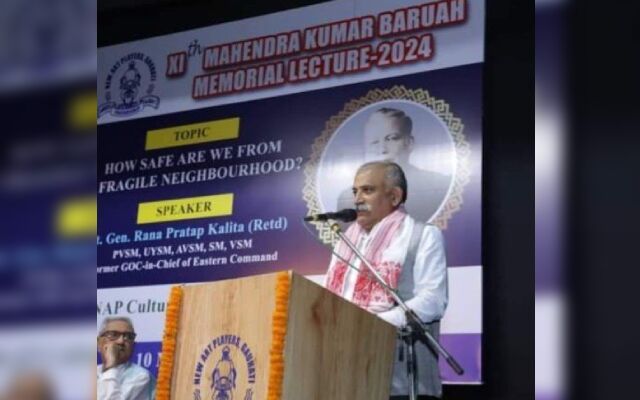
Guwahati, Nov 12: Lt General (Retd) Rana Pratap Kalita said that the nation needs 'a whole-of-nation' approach to counter various threats from neighbouring countries like China and to protect the national interest.
Kalita said this while delivering the 11th Mahendra Kumar Baruah Memorial Lecture, organised by New Art Players (NAP) at NAP Cultural Complex for Performing Arts in Gauhati Club area, on Sunday evening.
The topic of the lecture was ‘How safe are we from a fragile neighbourhood?’
“Future conflicts will extend beyond military engagements, requiring a coordinated effort across all national resources, including diplomatic, technological, and social fronts," he said.
Discussing India's multi-faceted security challenges, particularly focusing on the Northeast (NE) region, Kalita, former General Officer Commanding-in-Chief (GOC-in-C) of the Indian Army's Eastern Command, highlighted the complex web of factors affecting the NE's security and development.
“The unresolved border dispute with China remains a major security concern for India, especially along its North-eastern border. China has been constructing and upgrading infrastructure, such as roads, helipads, and border villages,” he said.
“This development is seen as a potential trigger for conflicts in the region,” he added.
Giving an overview of the geopolitical scenario in the world, Kalita said Myanmar's political instability and growing Chinese footprints in both Bangladesh and Myanmar compound the region's challenges.
"Chinese influence in these countries could threaten the Siliguri Corridor which is NE India's lifeline,” he said.
Lt Gen Kalita stressed that without a secured environment, development in the NE will remain elusive.
While insurgency has been largely controlled in the NE, issues in Nagaland and conflict in Manipur continue to remain, said Kalita.
He also said that the proximity of NE to global drug trafficking routes further exacerbates the situation.
Kalita further said growing cyber threats and using artificial intelligence (AI) also represent an emerging challenge, potentially paralysing critical infrastructure.
“The misuse of misinformation, as seen in recent unrest in Manipur, underscores the need for enhanced cyber security measures,” he said.
Earlier, a tribute-paying ceremony was held remembering the late members of NAP who, despite numerous challenges, brought the organisation to its current position in 1954.
NAP president Ajay Kumar Dutta along with guests and family members offered deep tributes to the departed members by lighting lamps and offering flowers.
NAP general secretary Rathindra Narayan Bhattacharya read the names of the late members. A minute of silence was also observed.
Theatre director and critic Nayan Prasad anchored the lecture programme, which commenced with a Mangalacharan by Sunayana Goswami Sharma.
In his welcome speech, NAP president Ajay Kumar Dutta reminisced about Mahendra Kumar Baruah, founder president of NAP.
On behalf of Baruah's family, Kuljit Baruah extended thanks to NAP for organising this lecture series since 1988. Kuljit Baruah's brother Diljit Baruah was also present in the programme.
-By Staff Reporter